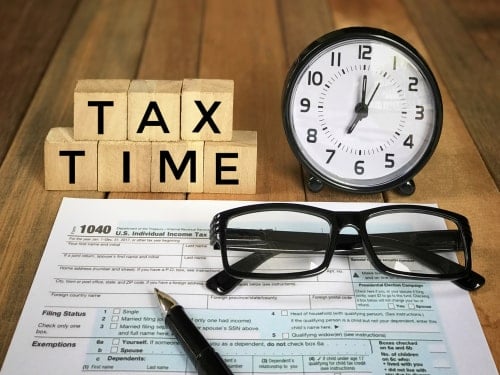
The dreaded end of year tax season is once again upon us. This can be a particularly stressful time for landlords trying to navigate what you can and cannot write off. There are, in fact, many tax benefits for rental property investors, but only if you know how to use them. So, continue reading below as we walk you through the top tax write-offs for landlords and best practices to get you through year-end tax time.
IRS Do’s and Don’ts Concerning Tax Write-Offs for Landlords
There is no denying that the IRS tax code can seem complicated to anyone that is not a tax professional. So, when it comes to tax write-offs for landlords, there are several things to consider. Thus, if owners collect rental income from a dwelling unit or units, landlords can deduct certain expenses. Let’s take a look at how the IRS defines what you can and cannot do.
Tax Write-Offs for Landlords the IRS Allows
Expenses for mortgage interest, property taxes, depreciation, and repairs are acceptable tax write-offs for landlords. Additionally, property owners can write off operating expenses such as management fees and other common business fees. Common expenses include maintenance, utilities, insurance, and the costs of certain materials, supplies, and repairs to keep the property in good condition.
For more information about specific IRS tax write-offs for landlords, visit the IRS website.

What the IRS Does Not Allow Landlords to Deduct
The IRS does not allow landlords to deduct the cost of improvements. That said, improvement is defined as the betterment, restoration, or adaptation for a new or different use. However, landlords can recover some improvement costs through depreciation and tax Form 4562. Although keep in mind, property owners can only deduct a percentage of these expenses in the year they are incurred.
For more information, check out the Tangible Property Regulations – Frequently Asked Questions on the IRS official website.
What Counts as Rental Income for Landlords?
One important aspect of tax time for landlords is to understand what constitutes rental income thoroughly. Therefore, avoiding a heightened risk of an audit. So, the IRS defines rental income as “any payment you receive for the use or occupation of the property.” Also, check out these examples below to pr further clarity.
- Monthly Rent Payments – Standard monthly rent payments count as income on a landlord’s taxes.
- Tenant Paid Expenses – Any services the tenant pays as part of their monthly rent is considered income.
- Service for Money Trades – When tenants “work off” part of their rent, the fair market value is still considered income for the landlord.
- Retained Security Deposit Funds – Any part of the security deposit withheld by the landlord for reasons such as early lease termination counts as income.
Top Ten Tax Write-Offs for Landlords
Part of being a savvy and successful rental business owner is knowing how to maximize the tax write-offs for landlords available to you. Interestingly enough, rental property investment enjoys more tax benefits than many other investment categories.
 So, to help you get the most from your year-end wrap-up, check out these top ten tax write-offs for landlords below.
So, to help you get the most from your year-end wrap-up, check out these top ten tax write-offs for landlords below.
- Interest
- Depreciation
- Insurance
- Professional or Legal Services
- Repairs
- Employees and Contractors
- Personal Property
- Pass-Through Tax Deduction
- Travel Expenses
- Home Office Allowances
Interest
Often hailed as one of the biggest tax write-offs for landlords, interest is a great deduction. Furthermore, deductions can include interest on mortgage loan payments used to purchase or improve the rental property. Additionally, landlords can claim the interest from credit cards used to purchase rental-related goods or services.
Depreciation
Depreciation allows property owners to get back a portion of the real estate cost over several years. The actual cost of a single-family property, multi-family building, or other rental unit is not fully deductible in the year you pay for it. For more information on how to make rental property depreciation work for you, check out our blog!
Insurance
The premiums paid on rental insurance policies such as landlord liability, fire, theft, or flood insurance are all tax-deductible. Additionally, if you employ individuals as part of your rental business, landlords may deduct costs related to their health and workers’ compensation insurance.
 Professional or Legal Services
Professional or Legal Services
Yes, rental owners can write off property management fees! Furthermore, fees paid to accountants, legal resources, advisors, or other professionals create a great source of tax write-offs for landlords. However, owners can only deduct these expenses if the professional services are directly related to their rental property business or activities.
Repairs
Repairs provide a source of beneficial tax write-offs for landlords. However, to be considered a deduction, the repair must be necessary, reasonable, and ordinary. Also, the repairs are only deductible within the year they occurred. So, some examples of these repairs include fixing a leak, repainting, replacing a broken window, or patching a roof.
Employees and Contractors
Hiring an outside contractor or employees to perform tasks related to a rental business entitles the owner to deduct their wages as a business expense. Furthermore, landlords can take advantage of this tax write off whether the individual is a repairman or a regular employee such as a property manager.
Personal Property
Personal property used in rental activity includes, but is not limited to, appliances, furniture, or gardening equipment. Using the de minimis safe harbor deduction, owners can deduct the personal property’s cost within the given tax year. However, this applies to qualified property items costing up to $2,000. Additionally, through 2022, landlords can also look into a 100% bonus depreciation to aid in their deductions.
 Pass-Through Tax Deduction
Pass-Through Tax Deduction
Expiring in 2025, this tax write off for landlords is a special income tax deduction as opposed to a rental deduction. Established by the Tax Cuts and Jobs Act, landlords may be able to deduct either of the following depending on their income level –
- Up to 20% of the Net Rental Income
- 5% of the Initial Property Cost + 25% of the Amount Owners Pay Employees
Travel Expenses
Whether it is showing properties or performing inspections, landlords can do a lot of traveling. That said, landlords can deduct most of the driving and travel expenses related to their rental activity. If you have a vehicle, van, or maintenance truck you use for rental business purposes, these tax benefits could add up. Therefore, these could include the following –
- Actual expenses such as gasoline, vehicle upkeep, or repairs
- Standard mileage – However, you must use it in the first year you use a car for your rental activity to qualify for the standard mileage rate.
Alternatively, property owners may not deduct travel expenses related to the improvement of the property. Instead, these expenses get added to the property’s tax basis and are depreciated over several years.
Home Office Allowances
Now more than ever, individuals find themselves working from home. As a landlord, did you know you can claim allowances for home office expenses? This is one of the little-known tax write-offs for landlords but is nonetheless important. So, if you meet certain minimum requirements, landlords can apply this deduction to spaces devoted to office work, a workshop, or other home workspace used for the rental business.
End of Year Tax Strategies Tips for Rental Property Owners
Every individual and rental business situation is unique in some way. Therefore, navigating tax time could reveal a tax bill that is not as manageable as you had hoped. Keep in mind that the tax code is complicated, and it is vital to get every advantage you can. So, consult a qualified accountant or tax professional to review your situation and guide you to the best outcome. In addition, consider these three end-of-year strategies below that may help put you in a more favorable position come tax time.

Maximize Every Deduction
As we stated throughout this article, maximizing tax write-offs for landlords is essential to coming out on top at tax time. Therefore, when it comes to expenses, timing is everything. So, if the rental unit has incurred plenty of expenses and offers plenty of subsequent deductions, delaying some non-critical expenses may prove beneficial. That said, if you do not have many deductions, moving up the timeline on scheduled maintenance could help your end of year taxes. After all, these deductions offset your overall income.
Donate to Charity
Business owners have been known to feel extra charitable towards the end of the year. However, it is for a good reason beyond helping others. In fact, these charitable contributions help to increase deductions, which in turn offsets taxable income. Therefore, this can be a beneficial strategy for landlords unable to come up with enough deductions through other means.
Deferred Income
Typically, income is subject to taxes within the year it is received. While not the strategy for everyone, deferring income is a possibility for self-employed rental business owners. That said, one way to defer income is to postpone the selling of assets until the following year. Thus, avoiding capital gains taxes for the time being. Deferring income can work to a landlord’s advantage or detriment, depending on the circumstances. So, always consult with a qualified tax professional or trusted financial advisor.
Conclusion
No one looks forward to the stress surrounding the end of year tax time, especially business owners. However, understanding beneficial tax write-offs for landlords is a big step towards easing some of that stress. Whether preparing for taxes or just running successful day to day operations, organization and attention to detail are critical. Feeling overwhelmed with the daily tasks your rental property demands?
A professional property management firm can help! Bay Property Management Group has the industry expertise and dedicated staff to make owning rental property the enjoyable and lucrative endeavor it should be. Whether it is targeted marketing efforts, coordinated maintenance, or comprehensive accounting, Bay Property Management Group has you covered, offering property management services in Richmond and throughout Northern Virginia, as well as Maryland, Pennsylvania, and Washington DC. Give us a call today for a free no-obligation rental property analysis!

 Professional or Legal Services
Professional or Legal Services Pass-Through Tax Deduction
Pass-Through Tax Deduction